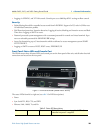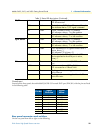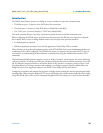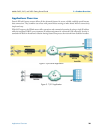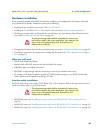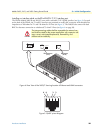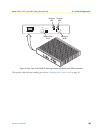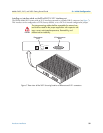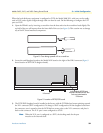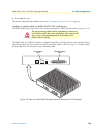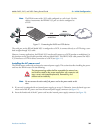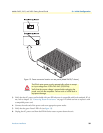
Hardware installation 28
Models 2603, 2621, and 2635 Getting Started Guide 3 • Initial Configuration
Hardware installation
If you are already familiar with IPLink Series Router installation and configuration, this chapter will enable
you to finish the job quickly. Installation consists of the following:
• Preparing for the installation (see section “What you will need”)
• Installing the T1/E1 WAN, X.21, or V.35 interface cable (see section “Interface cable installation”)
• Hooking up network cables, verifying that the unit will power up, and running a HyperTerminal session
(see section “Installing the Ethernet cable” on page 36)
• Changing the IP address from the factory default setting (see section “IP address modification” on page 37)
• Launching a web browser in preparation for configuring the modem (see “Web Operation and Configura-
tion” on page 37)
What you will need
• IPLink Series High Speed Router
• Ethernet cable with RJ45 plugs on each end (included with router)
• DB9-RJ45 adapter (included with router)
• RJ45/RJ45 straight-through cable for connecting to control port (included with router)
• PC computer with HyperTerminal or equivalent VT-100 emulation program, or an ASCII terminal (also
called a dumb terminal) capable of emulating a VT-100.
Interface cable installation
An IPLink Series router comes with a T1/E1 WAN, V.35, or X.21 interface. Refer to the appropriate section to
install an interface cable on your IPLink router:
• Model 2603 router (see “Installing an interface cable on the IPLink 2603’s T1/E1 interface port” on
page 29)
• Model 2621 router (see “Installing an interface cable on the IPLink 2621’s X.21 interface port” on page 31)
• Model 2635 router (see “Installing an interface cable on the IPLink 2635’s V.35 interface port” on page 33)
The interconnecting cables shall be acceptable for external use
and shall be rated for the proper application with respect to volt-
age, current, anticipated temperature, flammability, and
mechanical serviceability.
The interconnecting cables shall be acceptable for external use
and shall be rated for the proper application with respect to volt-
age, current, anticipated temperature, flammability, and
mechanical serviceability.
CAUTION
CAUTION



